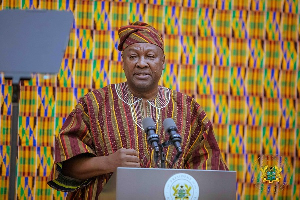…Reduce capacity of NDC, NPP to deliver
“The focus on campaigning and winning elections has created an overload of elections within the political space in between national elections that are held during the 4-year election cycle.”
This is the conclusion of a policy brief issued by the Institute of Democratic Governance (IDEG). With the heading “Election Overload: 2012 – 2016,” MPG Reforms Issues Brief No. 4 April 2014 exposes one of the weaknesses of Ghana's political parties as election fatigue.
“The concentration on party electoral activities and campaigns has reduced the capacity of political parties to pay adequate attention to developing and implementing public policies and programs that are necessary for strengthening public service delivery and advancing the development of the nation and the welfare of the people.
“Weak regulation of elections and political party activities has compounded this situation whereby political parties focus less on the development of public policies,” the IDEG brief notes. It states that the internal elections of the two main political parties, National Democratic Congress (NDC) and New Patriotic Party (NPP), overlap with each other. The presidential and parliamentary elections consume most of the time and resources of the parties.
According to the analysis of the policy think-tank, the parties have continuously focused on organising election campaigns and mobilising partisan support during and off election years. It states that during the first year after the 2012 polls, the NPP conducted elections of polling station executives, electoral area co-ordinators, constituency executives, regional executives and representatives on National Council, executives in the Diaspora and national executives.
The NPP has held most of these elections, with the national executive election characterised by keen, bitter and competitive elections conducted in April in Tamale. It is left with the presidential primaries scheduled for October 18 this year. A special congress is expected to be held on August 31 to elect five out of the seven aspirants who have been okayed by the National Council as required by the NPP constitution.
In the second year (i.e. 2014), the Electoral Commission (EC) is expected to conduct the District level elections. The NDC will hold the elections of branch executives, ward executives, constituency executives, regional executives, executives in the Diaspora, national youth and women's organiser and national executives.
In the third year (i.e. 2015), the parties elect their parliamentary candidates in constituency primaries. The time and date for the elections of parliamentary candidates may vary from constituency to constituency, depending on whether the sitting Member of Parliament (MP) is a member of the party or not. Later, the NDC will conduct the election of the presidential candidates.
In the fourth year (i.e. 2016), the EC will conduct the presidential and parliamentary elections in addition to tasks such as voter registration, exhibition of provisional voters register and registration of candidates. IDEG made the analysis based on some assumptions. One such assumption is that there will be no impediment(s) such as Supreme Court adjudication of an election petition and financial constraints that may cause the parties to alter their calendar. It also assumed that there will be no deaths/resignation of any of the executives within the four-year governance tenure that require a by-election.
But the assumption that there would not be an election petition at the Supreme Court was wrong, as the NPP, led by three leading members, Nana Addo Dankwa Akufo-Addo, the 2012 presidential candidate and his running mate, Dr Mahmud Bawumia, and the then party chairperson, Mr Jake Otanka Obetsebi-Lamptey, petitioned the country's highest court to declare the election of NDC's Mr John Dramani Mahama as president illegal and invalid.
Public Agenda contacted Professor Kwame Ninsin, a senior research fellow at IDEG, on phone to comment on the analysis, but he said he was indisposed. This paper tried to get about four governance experts to express their views on the IDEG analysis, but we could not make contact to any of them. Some experts have called for the extension of the four-year governance structure of the country. In 2009, President John Agyekum Kufuor suggested the extension of the presidential term from the current four years to five to allow a new leader time to settle in and produce results.
“The tenure of four years for the President of a struggling developing nation with weak institutions may be too short. This is especially so for an incumbent who though popular, may lack the requisite experience at the time of assuming office.”
General News of Friday, 8 August 2014
Source: Public Agenda













